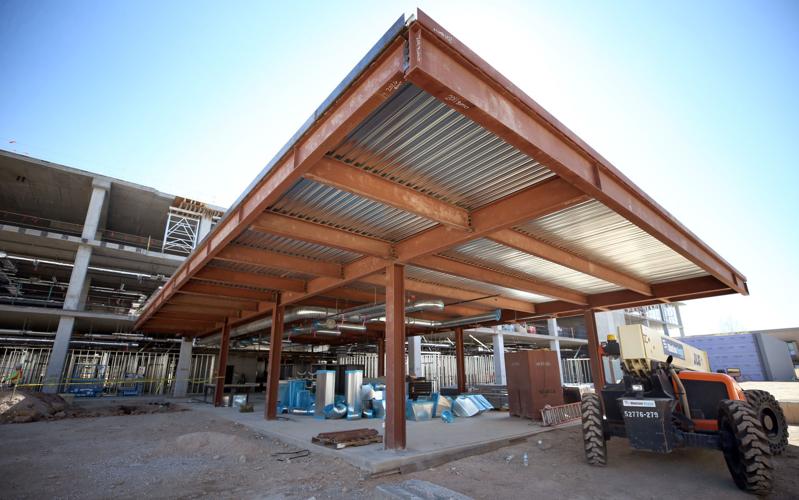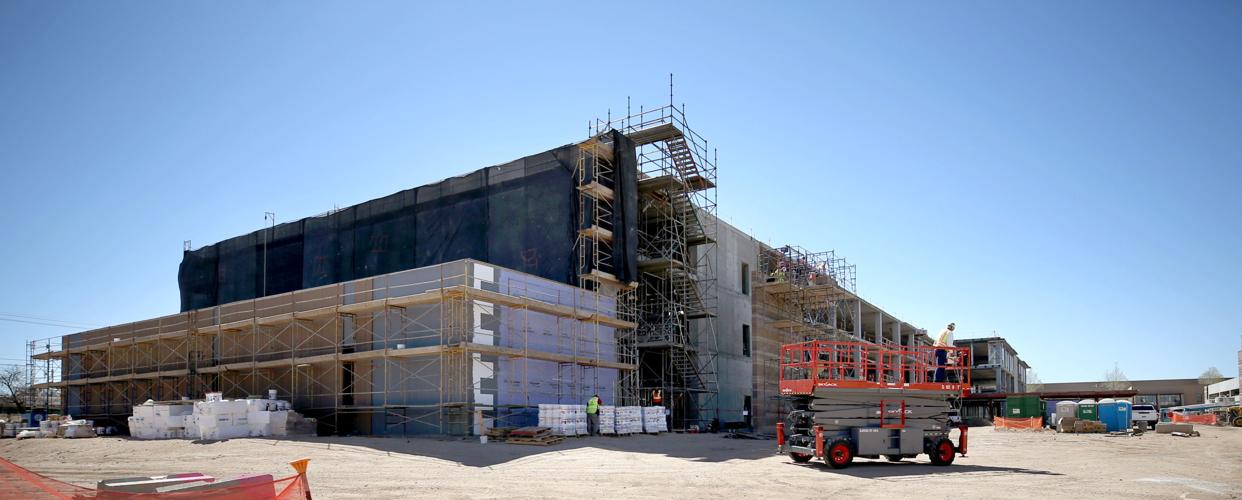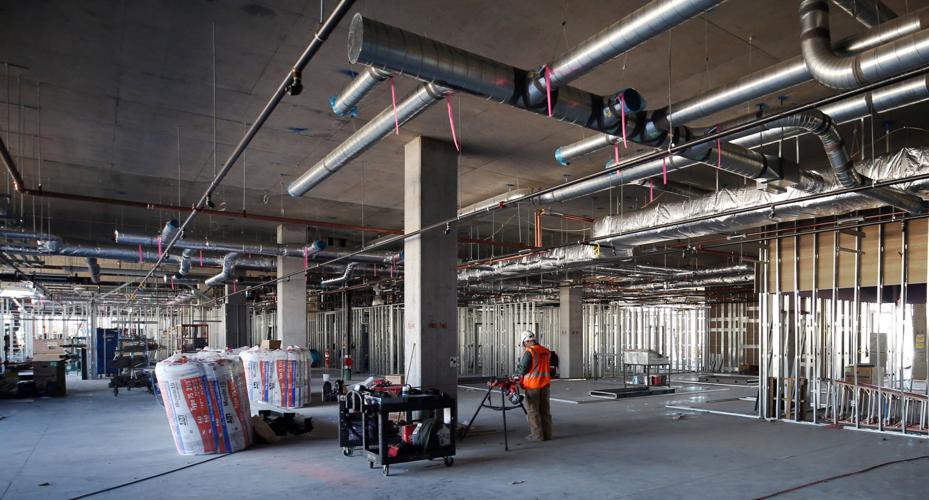Banner Health is losing money in Tucson, but company officials say the negative cash flow will be offset by future progress, including an updated and expanded local hospital.
The company’s Tucson operations lost $89 million in 2016, and officials expect to lose $45 million this year. Banner employs about 6,000 people in the Tucson area.
Losses among Banner’s Tucson operations have resulted in an initiative called the Tucson Performance Improvement Plan. The plan includes breaking even by 2018.
In addition, Banner has been belt-tightening system-wide, including restructuring and eliminating positions in an effort to cut $65 million from its corporate services departments this year. Company officials have been making regular announcements to employees about new cost-saving efforts and “reinvention initiatives.”
The not-for-profit, Phoenix-based company has also enlisted the help of consultants from McKinsey & Co. to look at other possible performance improvements.
“Any big company, especially in health care, has got to be flexible and change with the times. They (Banner) are a big ship and it takes a while to turn it,” said Jim Hammond, publisher of The Hertel Report, an Arizona health-care newsletter.
Hammond said uncertainty over the future of the Affordable Care Act is a concern for any health organization right now and that re-evaluating finances is a logical reaction.
“When you combine potential Medicaid cuts with the infrastructure requirements of MACRA (federal provider payment reform), all organizations really need to take a look at themselves and see where the are investing and where they might be able to tighten their belts,” Hammond said.
“There are a number of external forces that would make an organization make decisions like this.”
Indeed, Banner officials, like other U.S. hospitals, are concerned that a possible repeal of the Affordable Care Act, including changes to Medicaid, could negatively affect future revenue. Prior to the ACA, between 12 percent and 16 percent of Banner patients were uninsured. Now it’s about 6 percent.
About 31 percent of the patients who use Banner’s two Tucson hospitals are covered by Medicaid, which is a government insurance program for low-income people.
New acquisitions
Banner Health owns, leases or manages 28 acute-care hospitals in six states, as well as home health agencies, primary care clinics, urgent care facilities and home medical equipment supply services.
It owns Banner-University Medical Center Tucson, 1501 N. Campbell Ave., and also operates Banner-University Medical Center South, 2800 E. Ajo Way, through a lease agreement with Pima County.
Banner, which is the largest private employer in Arizona, acquired the University of Arizona Health Network in 2015, in addition to purchasing other properties such as the Casa Grande Regional Medical Center and Payson Regional Medical Center. A 2016 bond offering shows those purchases contributed to a below-target company operating margin of 1.8 percent that year, down from the 4.9 percent operating margin of 2014.
The two Tucson hospitals operated by Banner contributed to that dip. Each had negative operating margins in 2015 — well below the company target of positive 4 percent, and below the statewide average hospital operating margin, which was 1.9 percent for the 12-month period ending in November 2015, data from the Arizona Healthcare and Hospital Association shows.
The average hospital operating margin in Arizona for the first 11 months of 2016 was 3.7 percent, the association says.
Banner Health’s Tucson hospital operating margins for 2016 are due to be reported to the Arizona Department of Health Services in May.
“Fortunately we are in a strong cash and strong investment position. We can weather storms,” said Kathy Bollinger, executive vice president of Banner-University Medicine.
“Banner was fully aware of the financial performance of the health network at the time of the acquisition. However, losses have been greater than expected given the substantial investments needed to stabilize the organization.”
Construction
Banner has been putting money into its new acquisitions and into expanding its market share in Tucson and Phoenix.
The Tucson construction projects:
- A 670,000-square-foot, $426.7 million hospital at Banner-University Medical Center Tucson that’s going up west of the existing structure, plus renovating existing hospital space. Among other things, the project includes creating a new main entry and constructing 19 new operating rooms and prep/recovery spaces. Construction began in March 2016 and is scheduled to be completed in 2019.
- The Banner Health Center is a 207,000-square-foot, $98 million outpatient clinic under construction on the campus of the UA Cancer Center at 3838 N. Campbell Ave. It will include a multi-specialty health center to house specialty clinics that will relocate from the main campus, as well as an ambulatory surgery center and a parking structure. It is scheduled to open in 2018.
Those investments and others are necessary to keep pace within a fast-changing health-care environment, Bollinger said.
“You are not going to get better sitting and waiting,” she said.
Among other investments, the company in the last year acquired 39 new urgent care sites in Phoenix and Tucson — part of a strategy of providing extended-hours care to patients when their doctor’s office is closed.
The latest additions in Pima County are a Banner Urgent Care at 6021 N. Oracle Road and another at 7089 N. Thornydale Road. There are now a total of five Banner Urgent Cares in Tucson.
“It’s a service that’s obviously needed in both markets,” Banner Urgent Care CEO Dr. Rob Rohatsch said in a prepared statement.
“We’re fairly new to the urgent care business, but not to the health care business, so we’re striving to provide our communities with the best in care from a trusted, well-known health network.”
Biggest conversion
Another investment locally will be $30 million into converting the electronic health records at Banner Health’s Tucson facilities. The University of Arizona Health Network put $115 million into converting the health system’s paper files into electronic medical records through the company Epic. That conversion went live in 2013.
But since all of Banner’s hospitals are on a different system called Cerner, they’ll be converting to that system this year.
Having all of its health providers on one system will allow for larger amounts of data collection to conduct outcomes research, Bollinger said.
At the same time, the company, known for its financial discipline, is taking a hard look at where to cut costs. Recently, three executive positions with Banner’s Tucson faculty practice plan were eliminated and the company’s longtime top public relations executive in Phoenix was let go.
Also, about 30 Phoenix-based nurse case manager positions were eliminated from the company’s insurance division, company officials confirmed. And a small number of physicians were notified that their positions would be eliminated due to changes at clinics in Sun City, Peoria and Casa Grande, the Phoenix Business Journal recently reported.
“There’s no dangerous trend here. These kinds of things are going on at Abrazo, Tenet, Dignity. It’s just probably not making as much noise,” Hammond said.
“It’s a constant process that all of these large systems are dealing with. ... This is the natural ebb and flow of a company meeting the needs of its community.”
Bollinger said it’s difficult to put a number on how many employees will lose jobs, since many of them will get other positions within the company and have been encouraged to apply for them.
“We are trying to do this in a very transparent and strategic way. All responsible health-care systems are engaged in this work,” she said. “We’ve managed a lot of change in the last two years.”
Among positive changes Bollinger cites are reducing the annual nursing staff turnover in Tucson from 20 percent annually to between 4 percent and 6 percent.
“Banner has a very significant impact on Arizona. They have a model that really looks to standardize care across their hospitals, and they are interesting because of that,” said Eugene Schneller, a professor in the department of supply chain management at the W.P. Carey School of Business at Arizona State University.
“Banner has always had a strong focus on quality through adopting best practices, and that is what you are seeing,” he said.









